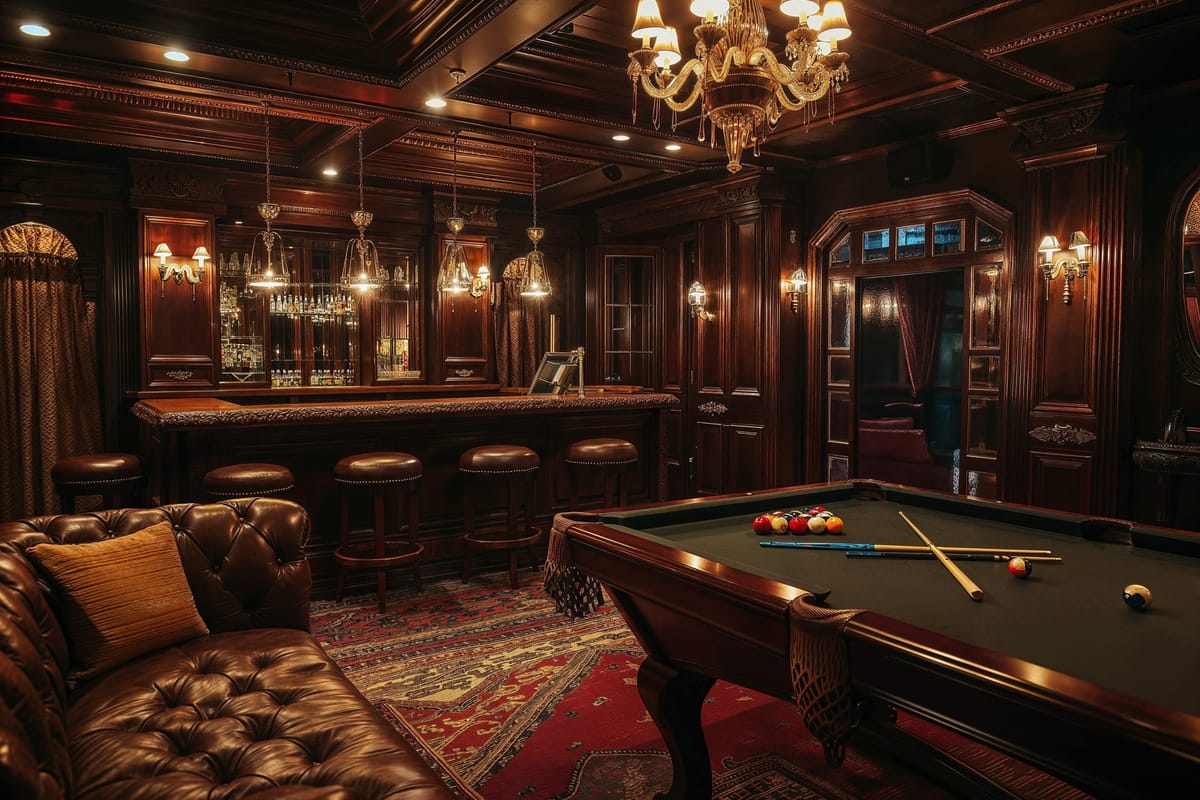The Psychology and Benefits of Man Caves: A Research Analysis

This research explores the psychological, social, and cultural significance of man caves—dedicated personal spaces that have become increasingly popular features in modern homes. Drawing from recent studies and expert insights, this analysis reveals why man caves serve as more than just recreational areas but fulfilling important psychological and emotional needs for men.
The Psychological Foundations of Personal Space
Territorial Behavior and Identity Formation
The concept of personal space is deeply ingrained in human psychology. According to research in the Journal of Consumer Culture, the desire for personal territory is a fundamental aspect of human nature that helps establish identity and maintain a sense of control over one's environment2. This territorial behavior isn't merely about physical ownership but serves as a crucial element in psychological well-being and self-definition.
Man caves represent a modern manifestation of this territorial need, providing men with a dedicated space that reflects their personality and interests. This concept of personal territory has historical precedents, from ancient meditation chambers to Victorian-era smoking rooms, demonstrating that humans have consistently sought private areas to call their own throughout history2.
Stress Reduction and Mental Well-being
One of the most significant psychological benefits of man caves is their potential for stress reduction. In today's fast-paced world filled with professional and family obligations, having a designated retreat can significantly impact mental health. Research published in the Journal of Consumer Culture reveals that men report their personal hangout spots allowed them to display unique identities, relax, and reflect on life goals1.
Dr. Mariam Beruchashvili, a co-author of the study "Mancaves and Masculinity," notes that when men are constantly in shared family spaces like kitchens filled with daily responsibilities, they feel perpetually "on" as they try to fulfill expectations as husbands and fathers17. The man cave provides a crucial opportunity to "chill out and take some time for yourself," with men in the study reporting that this recharge even made them better fathers and spouses1.
Social and Relational Benefits
Integration Rather Than Escape
Contrary to popular perception, research suggests that man caves aren't simply about escaping family responsibilities but can serve as "therapeutic, integrative spaces" that help men weave together multiple aspects of their identities5. Rather than representing a rejection of family life, these spaces can help men process and integrate their various roles and responsibilities.
The study "Mancaves and Masculinity" challenges the perspective that male spaces merely express a retrograde masculine ethos focused on escaping feminine domesticity. Instead, researchers found these spaces operate as venues for "reinventing themselves as more fully functioning males integrated within the home, family, and the fraternity of other men"512.
Fostering Healthier Relationships
Perhaps counterintuitively, having personal space may actually improve family dynamics. Men in research studies reported that having time to recharge in their personal spaces made them better partners and parents1. This suggests that rather than creating distance, well-utilized personal spaces can enhance connection by allowing individuals to bring their best selves to family interactions.
This finding aligns with the broader psychological principle that healthy relationships require both togetherness and autonomy. The man cave can provide the latter, creating space for reflection and rejuvenation that ultimately benefits the entire family system.
Identity Expression and Personal Development
Authentic Self-Expression
Man caves provide a unique opportunity for men to express aspects of their identity that might not be fully represented in shared family spaces. From sports memorabilia to tech setups or creative workspaces, these areas allow for personalization that reflects individual passions and interests24.
Research indicates that when outside their personal spaces, men often feel constrained by expectations related to their professional and family roles. The man cave offers freedom from these constraints, allowing for authentic self-expression and exploration of interests that might otherwise remain underdeveloped15.
Reflection and Personal Growth
Beyond mere recreation, man caves can serve as spaces for meaningful reflection and personal development. Men in research studies reported using these spaces to contemplate life goals and significant decisions1. This reflective function suggests that man caves can play an important role in personal growth and life planning.
This reflective capability aligns with broader psychological research on the importance of solitude for processing experiences and developing self-understanding. By providing a dedicated space for such reflection, man caves may contribute significantly to men's psychological development and life satisfaction.
Cultural Context and Evolution
Shifts in Domestic Masculinity
The rise of man caves reflects evolving conceptions of masculinity within domestic settings. Historically, men have had dedicated spaces like workshops and studies, but these were designed around specific activities rather than personal identity9. The modern man cave represents a shift toward spaces that honor male identity itself rather than just male activities.
This evolution can be seen in popular culture, with television shows like "Man Caves" (on air since 2007) explicitly advocating for these spaces12. Such programming reflects and reinforces cultural acceptance of designated male spaces within homes that have traditionally been seen as feminine domains.
Changing Family Dynamics
The emergence of man caves coincides with significant changes in family structures and gender roles. As domestic responsibilities have become more evenly distributed and women have gained greater autonomy, there has been increased recognition of all family members' needs for personal space and identity expression.
While some critics argue that man caves reinforce problematic gender divisions9, others suggest they represent a healthy adaptation to changing family dynamics, allowing men to maintain a sense of identity within more egalitarian household arrangements12.
Criticisms and Considerations
Potential for Family Disconnection
Some critics argue that man caves could potentially undermine family cohesion. As noted in one critique, "the implication is that the rest of the house...cannot adequately serve me and my precious individuality," suggesting a troubling antagonism between masculine identity and family identity9. This perspective cautions that poorly implemented man caves might reinforce isolation rather than healthy autonomy.
Gender Stereotype Reinforcement
Another critique centers on how man caves might perpetuate limiting stereotypes about masculinity. Organizations like The Man Cave, which runs preventative mental health programs for teenage boys, emphasize the importance of redefining masculinity beyond stereotypical interests often associated with man caves1011.
Hunter Johnson, CEO of The Man Cave, notes: "An integral part of our program is letting the young men redefine their own masculinity (and identity) for themselves, outside of stereotypes, gender norms, and social pressures"10. This suggests that while personal spaces are important, how they're conceptualized matters significantly.
Practical Implementation
Designing Effective Personal Spaces
Creating an effective man cave doesn't necessarily require extensive space or resources. Even small areas can be transformed into meaningful personal retreats through thoughtful design. Multifunctional furniture, creative storage solutions, and purposeful organization can maximize limited square footage while creating a space that serves psychological needs8.
The most successful man caves reflect genuine interests rather than conforming to stereotypical expectations. Whether dedicated to creative pursuits, gaming, sports, reading, or music, authenticity in design and purpose enhances the psychological benefits of these spaces48.
Conclusion
Research indicates that man caves fulfill important psychological needs for territorial expression, stress reduction, identity integration, and personal growth. Far from being merely recreational indulgences, well-designed personal spaces can contribute significantly to men's mental well-being and, somewhat paradoxically, to healthier family dynamics.
The most effective man caves aren't those that simply facilitate escape from family life, but rather those that help men integrate their various identities and responsibilities while providing necessary space for rejuvenation and reflection. As our understanding of gender, identity, and family continues to evolve, personal spaces like man caves will likely remain important—though their form and conceptualization may continue to transform as well.
Citations:
[1] https://www.menshealth.com/trending-news/a19544163/scientific-benefits-of-mancaves/
[2] https://neurolaunch.com/man-cave-psychology/
[3] https://www.linkedin.com/pulse/man-caves-she-sheds-ultimate-guide-getting-your-personal-daniel-lawry
[4] https://www.homegamesroom.co.uk/blogs/exploring-the-concept-of-man-caves/why-do-men-need-a-man-cave
[5] https://improbable.com/2015/04/29/mancaves-and-masculinity/
[6] https://themancave.life/programs/research-insights/
[7] https://www.sciencetimes.com/articles/27469/20200926/psychology-behind-man-caves-sheds.htm
[8] https://www.wickedbrick.com/blogs/wicked-brick/small-man-cave-ideas
[9] https://intellectualtakeout.org/2016/03/the-case-against-man-caves/
[10] https://inklinemedia.org/2018/07/29/the-man-cave-redefining-masculinity/
[11] https://themancave.life
[12] https://journals.sagepub.com/doi/full/10.1177/1469540514553712
[13] https://www.dakotastorage.com/blog/why-every-guy-needs-a-man-cave-infographic
[14] https://www.linkedin.com/posts/themancave-aus_the-state-of-masculinity-is-complicated-activity-7285497586810007554-QHwm
[15] https://queenscommonwealthtrust.org/the-man-cave-challenging-the-stigma-of-male-mental-health-in-australia/
[16] https://homegamesroom.co.uk/blogs/exploring-the-concept-of-man-caves/why-does-my-husband-need-a-man-cave
[17] https://www.housebeautiful.com/room-decorating/living-family-rooms/g45851977/man-cave-ideas/
[18] https://fastframe.com/blog/4-reasons-he-deserves-a-man-cave/
[19] https://en.wikipedia.org/wiki/Man_cave
[20] https://www.steel-line.com.au/a-guide-to-man-cave-psychology-and-design/
[21] https://naftel.co.uk/post/man-cave/
[22] https://www.reddit.com/r/AskMen/comments/a4eqeg/why_do_men_need_man_caves_in_their_own_house/
[23] https://drronehrlich.com/matthew-defina-positive-masculinity-the-man-cave/
[24] https://journals.sagepub.com/doi/abs/10.1177/1469540514553712
[25] https://slate.com/human-interest/2011/10/man-cave-masculinity-men-crave-their-own-spaces.html





